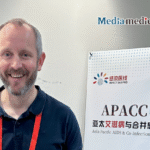
Editor's Note: The 2025 Asia-Pacific AIDS & Co-Infections Conference (APACC 2025) serves as the region's premier academic platform, focusing on cutting-edge issues in HIV prevention and control. At this conference, Dr. Benjamin Bavinton of the Kirby Institute at the University of New South Wales in Australia, a member of the APACC Scientific Committee, had multiple studies selected for inclusion in the conference abstracts. His team conducted several large-scale surveys to analyze service model preferences, regional equity barriers, and differentiated needs of key populations in PrEP promotion.IDF: Could you please give a brief overview of your research focus and current key projects?
Dr. Bavinton: My name is Benjamin Bavinton, and I work at the Kirby Institute, University of New South Wales in Sydney. My research primarily focuses on various aspects of HIV prevention, particularly among gay and bisexual men, other men who have sex with men (MSM), and transgender individuals. Specifically, I study pre-exposure prophylaxis (PrEP), sexual behavior, and HIV testing. I have also conducted extensive research on Undetectable = Untransmittable (U=U).
IDF: What are the main challenges or key bottlenecks you are currently encountering in advancing your research?
Dr. Bavinton: I believe every HIV epidemic worldwide faces unique challenges. Coming from Australia, our current major challenge is this: While we’ve made significant progress in reducing HIV diagnoses among Australian-born MSM, particularly those living in inner-city areas of major capitals, we haven’t seen the same level of success among migrant populations and people in outer suburban or regional areas.
Essentially, our biggest challenge now is one of equity—ensuring that the progress we’ve achieved in certain groups extends to everyone. We’re focusing heavily on overseas-born migrants in Australia, as they account for a growing proportion of new diagnoses. These communities face structural barriers to healthcare access, along with individual challenges like limited HIV knowledge. Our work aims to address these issues across multiple fronts to improve outcomes for these populations.
IDF: Would you mind sharing your thoughts and key takeaways from attending this conference?
Dr. Bavinton: I believe the APACC conference holds unique significance in our region. It stands out as one of the few platforms that gathers diverse stakeholders from across Asia-Pacific to focus specifically on HIV. While there are global conferences and more localized meetings, APACC serves as a crucial forum for regional collaboration.
What makes it particularly valuable is the combination of cutting-edge scientific presentations – Asia is indeed leading in many areas, especially in implementing testing and PrEP programs – with exceptional networking opportunities. The conference enables participants from different countries to connect and establish meaningful collaborative relationships.

Kirby Institute
Associate Professor
Associate Professor Benjamin Bavinton has worked at the Kirby Institute, UNSW Sydney since 2010 and is Group Leader of the Biobehavioural Prevention Research Group within the HIV Epidemiology and Prevention Program. His research focuses on the behavioural and epidemiological aspects of HIV and STI prevention among gay, bisexual, and other men who have sex with men and transgender people, along with broader LGBTQ+ health issues, in Australia and the Asia-Pacific region. Both in Australia and internationally, he has worked in HIV prevention for 20 years in the areas of community education, policy, capacity development, and research. He was Project Leader of the Opposites Attract Study, an international cohort study of HIV treatment-as-prevention in male serodiscordant couples. He currently conducts projects on monitoring, implementing and scaling up oral and injectable forms of HIV pre-exposure prophylaxis (PrEP) in Australia and Asia, identifying and addressing gaps in HIV prevention in Australia, and understanding sexual behaviour of among gay, bisexual, and other men who have sex with men and transgender women in Australia and the Asia-Pacific. He is the Kirby Institute’s senior investigator on Australia’s national HIV behavioural surveillance system, The GBQ+ Community Periodic Surveys.


